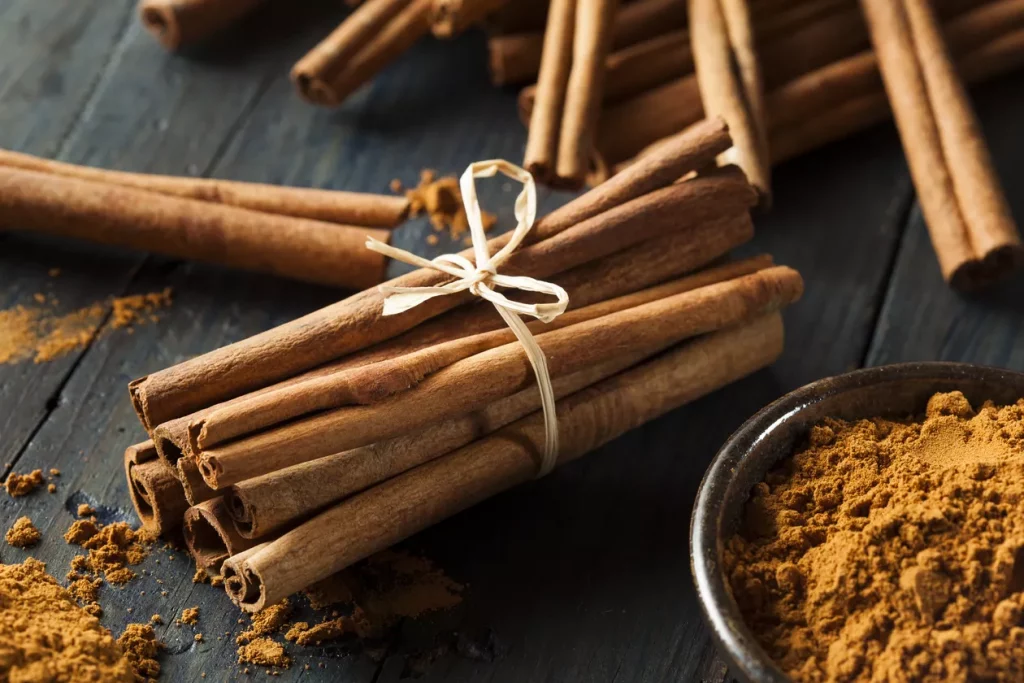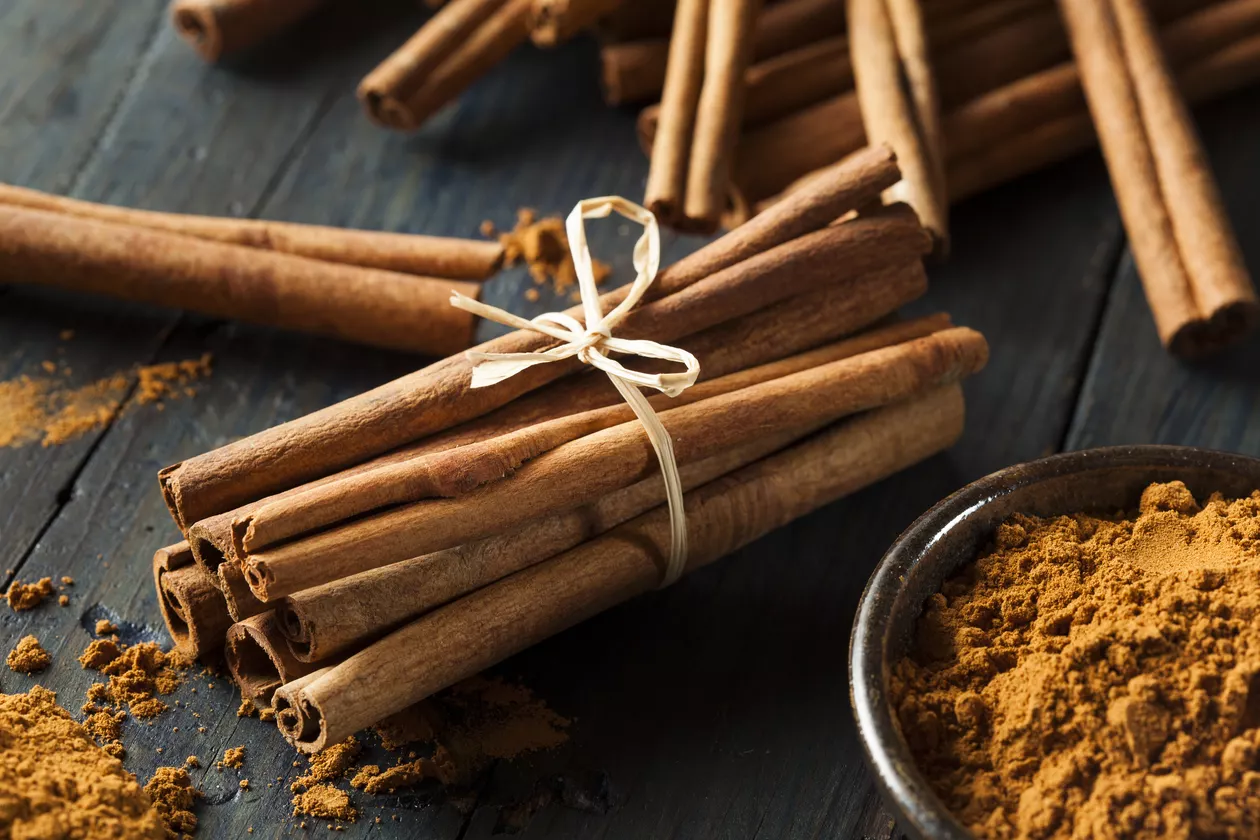Ceylon cinnamon can spice up your favorite dish by adding a unique aromatic flavor. Providing over 90% of the world’s supply, cinnamon from Sri Lanka is known for its wide range of health benefits. So, let’s try various ways of adding this delicious spice to your daily meals with different dishes, desserts, and drinks.

Health Benefits of Consuming Ceylon Cinnamon
Ceylon cinnamon contains various vitamins, minerals, and antioxidants with a lot of health benefits. The beta-carotene present in the cinnamon bark is the reason for its rich brown color. These carotene pigments can be converted to vitamin A, which is important nutrition for the health of the eyes.
Cinnamaldehyde present in Ceylon cinnamon has anti-inflammatory properties. This type of cinnamon can reduce symptoms related to heart diseases, diabetes, and arthritis. It can also reduce bad LDL cholesterol levels, which are linked with heart diseases. Studies show that cinnamon helps people with diabetes. Regular consumption of cinnamon increases the body’s natural response to insulin.
Nutrition
Ceylon cinnamon is rich in manganese, which manages the enzymes that produce hormones in repairing bones. Manganese is also an antioxidant which is a part of the enzyme manganese superoxide dismutase. This protects the body from free radicals. The other nutrients included in cinnamon are Vitamin A, Vitamin K, Potassium, Zinc, Magnesium, and Cinnamaldehyde.
Nutrients Per Serving
Different cinnamon varieties growing in various parts of the world have different nutrient content. A serving of one teaspoon of Ceylon cinnamon contains:
- Calories: 6
- Protein: Less than 1 gram
- Fat: Less than 1 gram
- Carbohydrates: 2 grams
- Fiber: 1 gram
- Sugar: Less than 1 gram
Watch Out for Coumarin
Coumarin is a chemical compound present in cinnamon, known to be harmful when consumed in large amounts. It can affect the kidneys and livers and even be carcinogenic. However, Ceylon cinnamon has only around 0.004% coumarin while Cassia cinnamon contains over 1% coumarin. Therefore, it is safe to consume cinnamon coming from Sri Lanka.
How to Use Ceylon Cinnamon
Cinnamon from Ceylon is usually a dried spice that is often found in local grocery stores. It can be used in both forms as cinnamon sticks and powder. So, it is easy to add cinnamon to most food items regardless of the nature of the food. You simply need to store cinnamon in an airtight container to secure its flavor. Here are some ideas for including Ceylon cinnamon in your diet.
- Prepare a cinnamon tea: Add a tablespoon of ground cinnamon into boiling water and steep it for 3 – 4 minutes. Then strain out the powder and enjoy your spicy cinnamon tea.
- You can also sprinkle some cinnamon in your hot chocolate to add a spicy aroma and flavor to the drink.
- Adding Ceylon cinnamon to chai lattes is another ideal way of enhancing the flavor.
- Stir your mulled cider with a cinnamon stick to taste the amazing flavors of cinnamon in your drink.
- Add a cinnamon stick to your alcoholic beverages in fall or winter as a seasonal garnish.
- Cinnamon rolls or cinnamon buns are one of the most popular foods baked around the world.
- You can also add ground cinnamon to apple or pumpkin pies, or other spicy dessert options.
- Use Ceylon cinnamon to spice up when seasoning meat and curries. Add a cinnamon stick to your pot of rice to get a warm woody flavor.
How Much is Too Much?
Cinnamon is usually safe to use in small amounts as a spice to flavor foods and drinks. It is usually linked with a lot of health benefits. But consuming too much cinnamon has potentially dangerous side effects. This applies mostly to Cassia cinnamon which comes from other countries except for Sri Lanka. Cassia cinnamon contains higher levels of coumarin that is not suitable for health.
The tolerable intake of coumarin is 0.05mg per pound of body weight. You can calculate your own tolerable intake depending on your body weight. This is usually around 8mg of coumarin per day for an adult and children can tolerate a lot less than this. One teaspoon of Cassia cinnamon contains 7 – 18 mg of coumarin. So you need to be a lot more attentive if you are using regular cinnamon. The safer option is to use Ceylon cinnamon which contains very low levels of coumarin.
Frequently Asked Questions
How Do You Take Ceylon Cinnamon Daily?
If you need to take cinnamon as a supplement, there are four ways in which you can add it to your diet.
- Sprinkle ground cinnamon on your food such as toast, drinks, and desserts. This is the simplest way to consume cinnamon.
- You can consume it as a beverage by making cinnamon tea. It is an effective way since the chemicals in cinnamon are soluble in water.
- Cinnamon supplement capsules are available in the market. But it should be recommended by a health professional. Make sure to check the dosage of capsules on the package before you consume.
- Swallowing cinnamon with honey relieves sore throats and coughs. It can also reduce the soreness caused by bronchitis.
What Happens if You Drink Cinnamon Water Every Day?
Drinking cinnamon water helps in losing weight naturally while improving overall health. Cinnamon is known to increase the body’s metabolism, by burning fat more efficiently. It also helps to regulate blood sugar levels, aids in digestion, and suppresses appetite. But make sure to consume safe amounts of cinnamon to enjoy these benefits. Drinking cinnamon water at night before bed helps to relax tired muscles and increase immunity.
Do Cinnamon Sticks Dissolve?
Even after you grind the cinnamon in the food processor, the cinnamon from the sticks will not fully dissolve in the food mixtures. This is because the cinnamon sticks come from the bark of plants that are too fibrous to dissolve completely. So, you will find ground cinnamon powder floating on the top of your beverages. Since cinnamon sticks added to curries will never dissolve, you just need to remove the stick from the pot before serving.
Conclusion
Being a delicious spice, Ceylon cinnamon also has both good and bad effects on health. The key takeaway is not to confuse it with Cassia cinnamon which could have negative health impacts. As long as you consume true cinnamon coming from Sri Lanka, you are safe to consume moderate amounts of cinnamon with your daily meals. Being a healthy, soothing, and warm addition, Ceylon cinnamon will be the ideal spice to flavor your food for fall and winter.
Related Post
